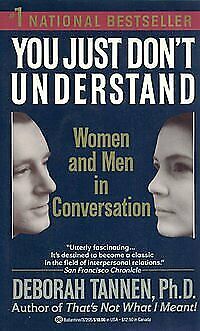 When I came across Deborah Tannen’s book, You Just Don’t Understand, it looked good, so I bought it, took it home, and placed it on my nightstand. That night I picked it up and started reading, and reading, and reading. The more I read, the more I laughed out loud. The subtitle—what it’s really all about . . .
When I came across Deborah Tannen’s book, You Just Don’t Understand, it looked good, so I bought it, took it home, and placed it on my nightstand. That night I picked it up and started reading, and reading, and reading. The more I read, the more I laughed out loud. The subtitle—what it’s really all about . . .
is Women and Men in Conversation.
“What are you laughing about?” my wife wondered.
“I’m laughing cause she’s talking about you and me.”
“What?”
Every night I read a few more pages, still laughing. I’m sure Dr. Tannen didn’t mean for her book to be taken as a comedy. She wrote it as a straight-forward description of the way men and women communicate, based on the way they think and their goals and purposes in the relationship. But when you see yourself and your spouse on every page, it makes you wonder, How did she know that’s what we do?
I think I learned more about communication with my wife from Tannen’s writing than from any other source. It was easy to see my wife’s foibles and laugh about them. Aha! See? That’s what you do! But then to read about what I do was a real eye-opener. I had to own up to my own patterns and behaviors.
What I learned was that Linda and I are pretty normal in how we communicate, and how we fail to communicate. In many ways, we fall into the stereotypes of male and female. But the way Dr. Tannen tells the stories is so funny. I called it my evening devotions. I had to read more.
One of the principles Dr. Tannen discusses in the book is the asymmetry between the way men and women think and communicate.
Men talk to Report; women talk to Rapport.
When there’s a problem, men move immediately into Fix-it mode; women move into Affirmation mode.
Men speak to establish Hierarchy; women speak to establish Community. Of course, these are generalities. There are men and women at both ends of each spectrum.
The truth is that women don’t need a fixer. And, contrary to popular myth, they don’t want a knight in shining armor to come and rescue them. They want someone they can relate to, someone who will affirm them, someone who takes time to understand.
Men are more comfortable talking about information than relationship. Their standard response to a problem is to come up with a solution, and they don’t understand why they’re not appreciated for it. They want someone who doesn’t read into their words and reinterpret them, but instead will take them at face value.
A couple years ago, a blogger posted an entry called Her Diary, His Diary. Hers was almost 300 words long. His had only seven words. She wrote that her husband was acting weird. He was upset about something, but wouldn’t talk about it. She tried to ask if she’d done something wrong, but he just said not to worry about it; it wasn’t about her. She was a total wreck by the end of the night, trying to figure it out, and finally concluded their marriage was over and her life was a disaster. His diary that day simply said, Motorcycle won’t start . . . can’t figure out why.
The comments from readers after the post, are just as telling as the original blog. Men sided with the husband. They got it. Women sided with the wife. They understood. Apparently, the writer struck a nerve.
In 1999, newspaper columnist and humorist Dave Berry wrote a classic piece about a man and woman on a date, Roger and Elaine, having a conversation in the car. The guy is concerned about the car, and the gal is worried about the relationship. Their conversation is hilarious, a great example of two people trying to have a discussion, making assumptions, but neither person knowing what the other is even thinking about or talking about.
Linda and I have had conversations like that. It’s not funny while it’s happening, but later on, it’s hilarious to look back, once we finally break through, communicate and understand each other.


Tannen is exactly right! When Carol and I learned that truth, our incidences of friction reduced remarkably. Oh, we still have some friction, but we understand it now. Thank you for sharing the book report.
LikeLiked by 1 person
Life with less friction is almost always an improvement, right? 🙂
LikeLiked by 1 person
Sounds like another book I’ll be adding to my “list.” How very true though, we do think, communicate, and process very differently from one another. I think the greatest harmony is found when we both try to give the other what they need. I try and listen to Diane more and not “fix it immediately”; and she tries not to worry herself sick because I’m preoccupied in thought. Our assumptions can lead to some funny things though; when we can look back upon the moment. 🙂
LikeLike